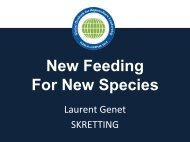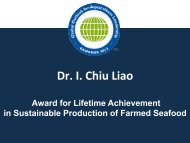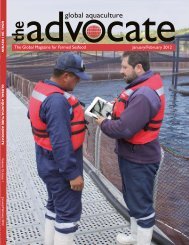May/June 2010 - Global Aquaculture Alliance
May/June 2010 - Global Aquaculture Alliance
May/June 2010 - Global Aquaculture Alliance
Create successful ePaper yourself
Turn your PDF publications into a flip-book with our unique Google optimized e-Paper software.
Nandeesha Joins BAP Standards Oversight Committee<br />
Dr. Mudnakudu Nandeesha<br />
has recently joined the<br />
Best <strong>Aquaculture</strong> Practices<br />
Standards Oversight Committee.<br />
He replaces Dr.<br />
Claude Boyd, who will continue<br />
to assist the BAP<br />
techincal committees.<br />
Nandeesha currently serves<br />
as an advisor to the Centre for<br />
<strong>Aquaculture</strong> Research and<br />
Development being established<br />
Dr. Mudnakudu Nandee- under the St. Xavier’s Bishramsha<br />
has more than 25 years ganj in Tripura, India. He has<br />
experience in teaching and more than 25 years of experi-<br />
research on aquaculture. ence in teaching and researching<br />
aquaculture in India, Cambodia<br />
and Bangladesh.<br />
He is a former professor of aquaculture at the College of<br />
Fisheries under the Central Agricultural University in Tripura<br />
and worked for a decade in the Department of <strong>Aquaculture</strong> at<br />
Acknowledging his ongoing<br />
work to advance the Best<br />
<strong>Aquaculture</strong> Practices (BAP)<br />
certification program,<br />
IntraFish Media named<br />
<strong>Global</strong> <strong>Aquaculture</strong> <strong>Alliance</strong><br />
President George Chamberlain<br />
one of six nominees for<br />
<strong>2010</strong> Person of the Year.<br />
“Chamberlain has made<br />
the right moves to put GAA<br />
George Chamberlain: and its BAP ecocertification<br />
“Mr. <strong>Aquaculture</strong>”<br />
into the forefront of the aquaculture<br />
sustainability arena,”<br />
IntraFish said.<br />
After a strong 2009, IntraFish said, GAA “solidified its spot at the<br />
top of the aquaculture ecocertification world, moving forward in both<br />
the expansion of certification standards and the development of an<br />
infrastructure within GAA to further grow its ecolabeling program.”<br />
Hundreds of aquaculture facilities in Asia, Central America,<br />
Europe and the United States are certified to GAA’s Best <strong>Aquaculture</strong><br />
Practices standards. Adding to the current standards for<br />
processing plants and tilapia, channel catfish and shrimp farms,<br />
BAP certification will extend to feed mills and Pangasius farms<br />
later this year.<br />
GAA Vice President of Development Peter Redmond has<br />
successfully carried the BAP message to top retailers. Dozens of<br />
major grocers, retailers and foodservice companies around the<br />
world have joined Walmart Stores in support of BAP certification.<br />
IntraFish called Chamberlain “Mr. <strong>Aquaculture</strong>.” He has served<br />
as GAA president since the organization’s founding over a decade<br />
ago. Chamberlain said his nomination symbolizes the strides the<br />
organization has made in advocating responsible aquaculture.<br />
The IntraFish Person of the Year award goes to a seafood<br />
industry leader who clearly influences the direction of the global<br />
the University of Agricultural Sciences in Kartaka, India.<br />
Nandeesha also spent nearly a decade on grass-roots aquaculture<br />
projects supported by Oxfam International, the Food and Agriculture<br />
Organization of the United Nations, World Bank and<br />
Network of <strong>Aquaculture</strong> Centres in Asia-Pacific.<br />
Nandeesha has a doctorate degree in aquaculture nutrition.<br />
Through the publication of two books and over 100 papers and<br />
articles, he had contributed to the fields of fish nutrition, fish<br />
reproduction, developing aquaculture technologies for small<br />
farmers, gender issues in aquaculture and fisheries education.<br />
He served on the World <strong>Aquaculture</strong> Society board of directors<br />
from 2006 to 2009. He is also a co-chairman of <strong>Aquaculture</strong><br />
without Frontiers.<br />
Nandeesha has been recognized through a number of awards,<br />
including the Sahameitrei Award from the government of Cambodia<br />
for his contributions to the aquaculture and human<br />
resource development of that country. He also received the Professor<br />
H. P. C. Shetty and Gold Medal Awards from the Asian<br />
Fisheries Society. The International Research Foundation, Sweden,<br />
presented Nandeesha the Jubilee Award in 2002 for his<br />
efforts in the field of fish nutrition.<br />
Chamberlain Nominated For IntraFish Person Of Year<br />
industry. The recipient of the award is decided by the votes of<br />
IntraFish readers. The winner was to be announced at the European<br />
Seafood Exposition in Brussels, Belgium, in late April.<br />
Advocate Goes Green(er)<br />
The <strong>Global</strong> <strong>Aquaculture</strong> Advocate is getting greener. After<br />
reducing the number of annual print issues while maintaining<br />
six issues via digital delivery, GAA’s bimonthly magazine is<br />
making further changes to lessen its environmental impacts.<br />
Beginning with this <strong>May</strong>/<strong>June</strong> issue, the Advocate will be<br />
printed on paper stock with at least 10% post-consumer<br />
recycled content. The masthead will also bear the logo of the<br />
Sustainable Forestry Initiative (SFI) chain-of-custody certification<br />
system for responsible forestry practices.<br />
GAA’s publication printing partner – St. Louis, Missouri,<br />
USA-based Mulligan Printing – is handling the transition<br />
to the greener Advocate.<br />
After working with GAA in the move to fewer printed<br />
issues, Mulligan proposed the current changes as additional<br />
ways to decrease the magazine’s overall footprint. Mulligan<br />
Printing also participates in AmerenUE’s PurePower clean<br />
air program utilizing renewable energy.<br />
“This is definitely a case where less is more,” GAA<br />
Assistant Director Sally Krueger said. “We appreciate the<br />
input we receive from Mulligan and will consider further<br />
changes in the future.”<br />
The non-profit Sustainable Forestry Initiative maintains<br />
the largest single forest standard in the world. SFI addresses<br />
such issues as worker health and safety, fair labor practices,<br />
civil rights, anti-discrimination and fair wages. Although the<br />
SFI program certifies lands only in the United States and<br />
Canada, program participants must show that paper fiber<br />
they buy offshore is from responsible and legal sources.<br />
BAP Standards Oversight Committee Approves Feed Standards,<br />
Considers IOMs For Small Farms<br />
Wally Stevens said market demand is driving an increase<br />
in farm certifications.<br />
Continued progress in standards development and market<br />
reach was reported at the Best <strong>Aquaculture</strong> Practices (BAP)<br />
Standards Oversight Committee (SOC) meeting held March 14<br />
in Boston, Massachusetts, USA.<br />
In his introduction, GAA Executive Director Stevens summarized<br />
the overall progress of the BAP program. He referred to<br />
large posters and said market demand for “two-star” product<br />
from BAP-certified farms and processing plants is driving an<br />
increase in farm certification, particularly at tilapia facilities.<br />
Additional processors are becoming engaged in anticipation of<br />
the BAP salmon farm standards.<br />
Stevens also described the proposed new organizational<br />
structure that would integrate the <strong>Aquaculture</strong> Certification<br />
Council (ACC) with GAA to manage the BAP certification<br />
process using ISO-accredited inspection bodies to conduct facility<br />
audits. Under the plan, the SOC would become part of the<br />
Responsible <strong>Aquaculture</strong> Foundation, a new body with charitable<br />
status. Within the foundation, Jeffrey Peterson would direct<br />
BAP’s education and training program.<br />
Integrated Operating Modules<br />
ACC President Jim Heerin joined Vice President Bill More<br />
and Peterson in providing an update on the Integrated Operating<br />
Module (IOM) program for multiple small shrimp farms.<br />
In IOMs, a number of farms with similar production methods<br />
and combined total annual production not exceeding 4,000<br />
mt can be grouped together. All undergo full inspections and<br />
participate in traceability, but modified administrative arrangements<br />
allow the farms to save on certification costs. Each IOM<br />
must have a written quality management system defining how<br />
the group is managed to meet BAP standards criteria.<br />
Feed Standards<br />
The BAP feed mill standards were approved for release<br />
pending final changes and review. Requested changes included a<br />
requirement that sources for all fishmeal and fish oil be certified<br />
to the International Fishmeal and Fish Oil Organisation (IFFO)<br />
<strong>Global</strong> Standard for Responsible Supply or Marine Stewardship<br />
Council program within three years. Until that time, feed mills<br />
are required to develop a plan for transition to sustainable fishmeal<br />
sources.<br />
Tilapia, Salmon Standards<br />
Review of the BAP standards for tilapia farms saw a request<br />
to begin collecting fuel and energy use data so figures for direct<br />
energy use can be calculated. The SOC recommended the establishment<br />
of a minimum mean annual survival rate as an indicator<br />
of fish welfare. It was also suggested that the guidelines for predator<br />
control should be further strengthened and defined.<br />
Progress continues to be made on the BAP standards for<br />
salmon farms. Jon Bryan of the Tasmanian Conservation Trust<br />
was approved to join the Salmon Farm Technical Committee.<br />
As at tilapia facilities, fuel and energy use data will be recorded.<br />
In the future, such topics as greenhouse gases, acidification,<br />
biotic resource utilization, accumulated energy and eutrophication<br />
potential may be addressed in the standards.<br />
Introduced Species<br />
The BAP standards require documented proof that it is legal<br />
to farm a species in a particular place. To strengthen this, the<br />
applicability of the International Council for the Exploration of<br />
the Sea (ICES) Code of Practice on the Introductions and<br />
Transfers of Marine Organisms 2005 was considered.<br />
The code outlines requirements for member countries to<br />
consider ecological, genetic, disease and economic impacts prior<br />
to introducing a marine species. However, ICES only has 20<br />
member countries, with no tropical or developing countries. It<br />
was concluded that the BAP program is functionally equivalent<br />
to the World Wildlife Fund tilapia standards regarding introduced<br />
species.<br />
Social Accountability<br />
Various options were discussed as to how to strengthen social<br />
accountability in the BAP standards. They could include a specific<br />
anti-discrimination clause and bans on forced or bonded<br />
labor. Interviews with workers could be conducted off site to<br />
allow more freedom in responses.<br />
Collaboration between BAP and Fair Trade certification –<br />
which channels price premiums back to producers for social<br />
projects and community benefits – may be considered. In a presentation,<br />
<strong>May</strong>a Spaull of TransFair explained that Fair Trade<br />
certification does not aim to duplicate BAP. The program<br />
addresses economic and social criteria in the production and<br />
trade of agricultural products, and wants to address environmental<br />
issues, but not through its own standards.<br />
Audit Formatting<br />
BAP’s shift to ISO-65-accredited certification bodies for<br />
inspections saw a corresponding shift in the audit documents.<br />
BAP’s original audit forms included critical and scored questions,<br />
while the new processing plant audit has eliminated all<br />
scored questions in favor of the yes/no responses typical of<br />
GFSI-compliant standards.<br />
To make the program more consistent across facility types,<br />
possible solutions include converting scored questions “up” to<br />
critical or “down” to recommendations in the guidelines.<br />
Another option is to keep the scoring system, but identify persistent<br />
problem areas and then modify the standards accordingly.<br />
No decision on how to address the situation was made.<br />
14 <strong>May</strong>/<strong>June</strong> <strong>2010</strong> global aquaculture advocate global aquaculture advocate <strong>May</strong>/<strong>June</strong> <strong>2010</strong> 15





